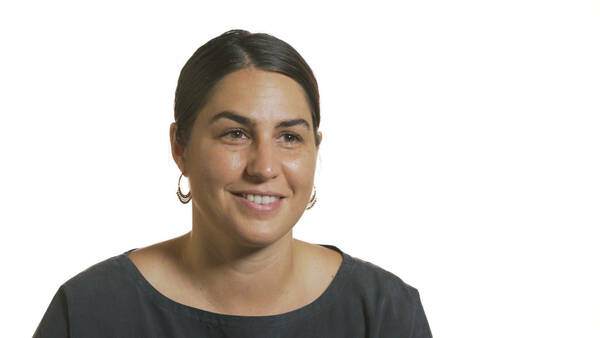
“In my writing, I'm often asking questions about how patterns of migration have shaped literature from antiquity to the present day.”
— Azareen Van der Vliet Oloomi
Azareen Van der Vliet Oloomi is an associate professor in the Department of English, director of the Creative Writing Program, concurrent faculty in the Department of Romance Languages and Literatures, and a faculty fellow in the Nanovic Institute for European Studies and the Kroc Institute for International Peace Studies. She is the author of the novel Call Me Zebra (Houghton Mifflin Harcourt, 2018) winner of the 2019 PEN/Faulkner Award for Fiction. More information can be found on her faculty page.
Video Transcript
In my writing, I'm often asking questions about how patterns of migration have shaped literature from antiquity to the present day, and how exile, state-sanctioned violence, gross human rights violations can have an impact on the human psyche and on our emotional landscapes. And I'm also thinking about how history imprints itself on actual physical landscapes.
Call Me Zebra is my second novel and it took me many many years to conceive of it and then to, to actually write it, and the thing that inspired me the most was this question of, can we really retrace our footsteps as migrants and access a space and time and a self that existed in a previous iteration in a different cultural and linguistic landscape?
My third novel is called Savage Tongues and it looks at questions of nationhood and identity and memory, and it's also looking at questions of gender and gender-based violence.
I think Notre Dame is THE place for asking these questions. It's, it's an institution that has always been devoted to social justice. It's an institution that really thinks very carefully about the intersections of theology and literature, artistic production, technology, and human progress. It's also an incredible place to be as a writer because you have so much support around your writing time and also funds to conduct research internationally. Every single book that I've worked on ISLA has stepped in and stepped up to help me do the research abroad into the spaces that I've been writing about, not just to do archival research, but to just have a fully sensorial experience of the space so that I could render it on the page.
I absolutely love being in the classroom. I think that the classroom is really for me an extension of my work as a writer and an artist in the world. It's the space where I get to ask these questions alongside other curious minds and explore them collectively, right, because we're dealing with questions of collective memory, collective forms of violence.
Teaching here at Notre Dame has been actually a remarkable experience. I think our students are honestly among the most genuine and intelligent and engaged students. They don't take their education for granted. They're incredibly serious and dedicated, so it's a genuine pleasure to teach them.
Originally published by at al.nd.edu on March 15, 2021.